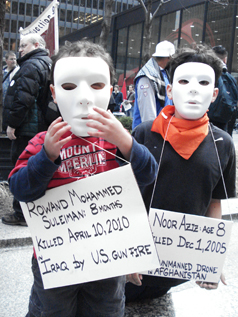Did you know that Truthout is a nonprofit and independently funded by readers like you? If you value what we do, please support our work with a donation.
Two days before the seventh anniversary of the occupation of Iraq, more than a thousand antiwar protesters marched Thursday in downtown Chicago to chants of “Obama, don’t lie to me. Bombs don’t bring democracy!” and “Money for jobs and education, not for wars and occupation!” The rally is one of many antiwar events being held across the country in places ranging from New York to Utah to Georgia to protest the ongoing wars in Iraq and Afghanistan.
“We have given everything as veterans, as citizens, as people,” Eugene Cherry, a former combat medic in Iraq and member of Iraq Veterans Against the War, told the rally. “The only way to support the troops is to bring them home. It is not their mission.”
According to then-President George W. Bush, who led the push for the US invasion of Iraq on March 20, 2003, it was a war of liberation. But according to the Iraqi refugees, parents of soldiers serving abroad, war veterans of US wars both old and new and advocates from more than 80 veterans’ advocacy organizations, among others present at the march on Thursday, the war in Iraq is a war of occupation.
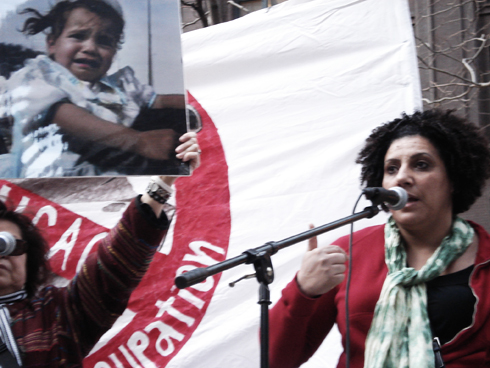
Fatma Hindi addresses the antiwar rally.
The Bush administration justified the invasion by telling the American public that Saddam Hussein, then-dictator of Iraq, was in possession of weapons of mass destruction and helped plan the 9/11 attacks. To date, no weapons of mass destruction have been found by either the US military or an independent United Nations investigation, but the war has claimed the lives 4,300 US soldiers, physically and psychologically damaged hundreds of thousands more and cost US taxpayers $700 billion. Current estimates for Iraqi civilians killed since the invasion stand at more than half a million.
There are 98,000 troops in Iraq, and there is expected to be a drawdown to 50,000 before September.
For Fatma Hindi, a former professor of journalism at the University of Baghdad and now an Iraqi refugee working with the Refugee Center for Hope in Chicago, the show of support at the march left her speechless.
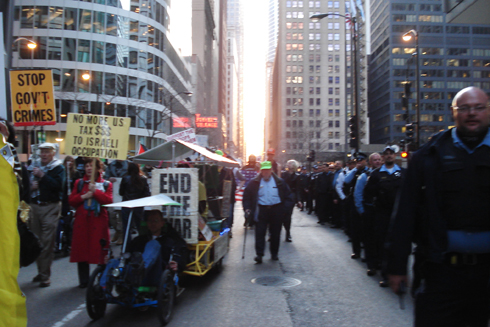
Chicago police stand alongside the protesters.
“I have not [got anything] to say because I want to scream, because I want to cry,” said Hindi, whose sister’s family in Iraq was killed in an explosion two weeks ago and who was herself both kidnapped and raped before finding a safe haven in Chicago. “I want to thank you so much because you are here with me now.”
Other speakers highlighted the need to get the 98,000 troops still in Iraq back home and the Chicago Public Schools’ place as the school district with the largest number of Junior Reserves Officer Training Corps, which are concentrated in low-income, under-funded communities.
The marchers walked more than four miles, carrying signs and banners with messages such as “End the Wars,” “Fund Healthcare, not Warfare” and “How much longer?,” escorted by a cordon of police on foot, in cars and riding horses as the sun set over Michigan Avenue, a major Chicago shopping street, partly blocked off for the protest.
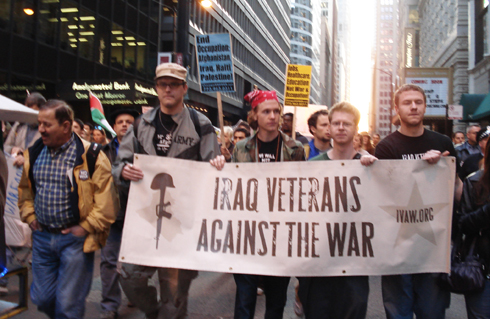
Iraq Veterans Against the War march in the protest.
Fred Mecklenburg, 50, of Chicago, an organizer of the event and representative of Public Workers United, “wanted to be involved in [the rally] because every problem today is an international problem, and we need to find ways to help out the progressive movements in other countries and not just bomb countries. So, I want to support groups like Revolutionary Association of Women of Afghanistan and people like Malalai Joya who opposed the war and the Taliban and the corrupt government in Afghanistan.”
Kathy Kelly, a Chicago-based antiwar activist with Voices for Creative Nonviolence and three-time Nobel Peace Prize nominee, has worked in Iraq on and off since 1996, bringing medicine and food to Iraqis, in violation of the US blockade, and spent a year in prison for planting corn on nuclear missile silo sties.
Kelly, who has not paid income taxes since 1980 to avoid contributing to American wars abroad, and who greeted American troops coming into Baghdad at the start of the Iraq war with water, dates and an antiwar banner, said that the act of protest is important, no matter how long the war in Iraq continues.
“It’s not easy for people to come home from work and go to a meeting or get on the phone to call people to support this work. This is all hard work,” she said. “I hope that for young people especially there will be a sense of kindred people coming together, that will be a sense of inspiration.”
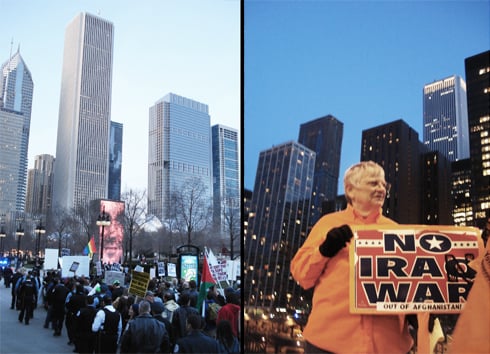
The march took up half of Michigan Avenue, a major shopping street in Chicago.
We must fight “the ruination of so many families and so many young people’s prospects for a decent future,” Kelly went on to say, “as has been caused by the very lethal combination of economic warfare and occupation.”
For young protesters such as Jessy Johnson, 20, a student in Chicago who came to the protest wearing earrings with the peace symbol; Allison Nicotera, 18, from Chicago; Elaina Polovick, 20, a student at Loyola University in Chicago; and Gabriel Pare, 19, of Chicago, continuing the fight against the wars in Iraq and Afghanistan is essential for their future.
“I believe all war is unlawful,” Pare said. “Especially with this one in Iraq and Afghanistan.”
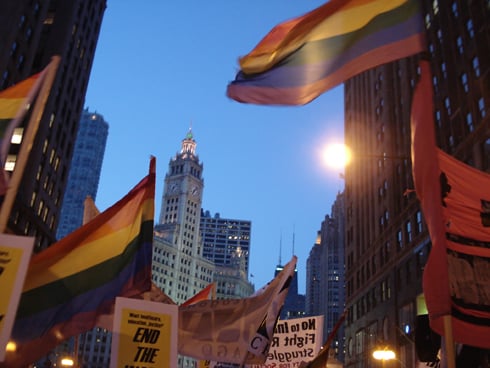
The protesters marched more than four miles.
Polovick said, “Over this past semester I’ve been getting more involved with the anti-violence movement.” Also, she said that because Loyola is a Catholic university, “I’ve become more aware of a Christian message of peace and not war.”
Johnson said she came to the rally because she thinks that many people are starting to forget about the war and the number of people who have died as a result.
Also, Carol English, 67, of Chicago, said she came to the rally for many reasons. She said she wants the US government to know that people are opposed to the war and “we’re opposed to the war for oil.” Also, she said, “people [in Iraq and Afghanistan] are going to choose their government” and that the US can’t force a kind of government on Iraq or Afghanistan. And she said, “We need this money at home” that’s being spent on the wars.
Other upcoming antiwar events include the following: pjep.org/announcements/?id=961
Photos by Yana Kunichoff.
Media that fights fascism
Truthout is funded almost entirely by readers — that’s why we can speak truth to power and cut against the mainstream narrative. But independent journalists at Truthout face mounting political repression under Trump.
We rely on your support to survive McCarthyist censorship. Please make a tax-deductible one-time or monthly donation.
